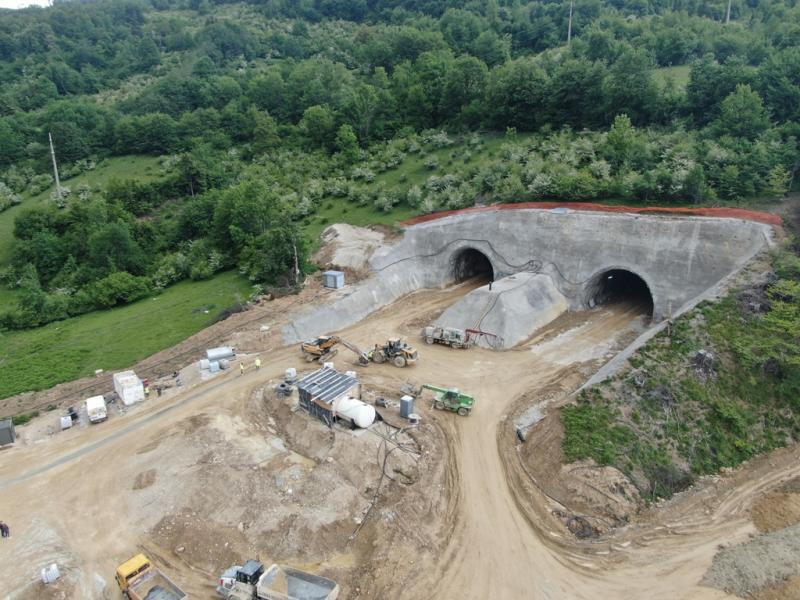Despite the COVID-19 pandemic Bosnia and Herzegovina’s new motorway keeps rolling, thanks to EU grants, financing from the EU bank—and a refusal to give up
The people of the Western Balkans know how to keep going, even in troubled times. Still, it’s impressive that, despite the economic and social difficulties of the COVID-19 pandemic, construction work on a new transport artery in Bosnia and Herzegovina continues to transform rugged terrain into a modern, sleek highway that will benefit travel speeds and road safety.
Uninterrupted work on this major regional highway, known as Corridor Vc, has been possible thanks to precautionary measures set up by authorities in Bosnia and Herzegovina and the contractors, who introduced rigorous safety protocols and protective equipment. The health of construction workers is monitored daily and the sites are regularly disinfected. The aim of these efforts is to keep operations going, retain jobs and ensure regular incomes for the people engaged on this project.
“We try to reorganise our work as much as we can and keep going as we would in normal circumstances,” says Semir Muslic, site supervisor at Ivan Tunnel, one of the contractors.
“Construction sites are isolated zones. We work a couple of days in a row and rarely go home, to reduce the risk of exposure. All workers here are like a family. Most important for us is to stay healthy and keep our jobs.”:
Despite COVID-19 pandemic Bosnia and Herzegovina ensures timely supply
It’s a daunting task to provide adequate medical safety measures and restrictions and, at the same time, to ensure timely procurement and supply of construction materials and spare parts for machinery. COVID-19 has disrupted supply and production chains globally. EU support, through various initiatives, has been essential for the Western Balkans, enabling easier circulation of goods within the region and into the EU, for all kinds of projects, including the Corridor Vc construction.
“Despite the current crisis caused by the coronavirus, which will have significant consequences on the economy and budget, the government of Republika Srpska does not give up its strategic projects, the planned dynamics and timeline of their implementation,” Djordje Popovic, Minister of Transport and Communications for the Republika Srpska, one of the two entities that make up Bosnia and Herzegovina. “We hope that for all these projects, as before, we will have the support of the European Union and that the planned grant funds for transport projects will not be reduced.”

Faster commuting for 1.5 million people
The significance of this ambitious investment programme is far-reaching. Corridor Vc is one of the most important transport project in the region, connecting Bosnia and Herzegovina to Hungary, eastern Croatia and the Adriatic Sea. The European Investment Bank has invested €631 million in the construction of 102 km of motorway on this corridor.
These funds have been complemented by the European Bank for Reconstruction and Development loans and more than €200 million in the European Union grants, provided under the Connectivity Agenda. These have been channelled through the Western Balkans Investment Framework, a blending facility supporting EU enlargement and socio-economic development in the region.
In August, another EU grant worth €11.8 million was unlocked to finance construction of the 6.9 km Tarčin-Ivan section of Corridor Vc.
“The European Investment Bank remains committed to the long-term, sustainable development of Bosnia and Herzegovina, and we are proud of our role as one of the major investors in the country’s road infrastructure,” said Matteo Rivellini, head of lending in Croatia, Slovenia and the Western Balkans for the EU bank.
“As motorways are drivers of economic and social development, this section will speed up the integration of Bosnia and Herzegovina with the EU and help create new business opportunities throughout the region—and jobs and income for ordinary people.”
“In times of economic uncertainty due to the COVID-19 pandemic,” Rivellini added, “strategic investments like this are clear signals that the EU bank remains a reliable partner for the Western Balkans.”
Connecting cities, regions and countries creates a whole new range of opportunities for socio-economic growth, employment and regional trade flows. Modern roads lead to increased safety, lower accident rates and vehicle operating costs. Nowadays, 1.5 million people living along the Corridor Vc have access to a new highway that cuts their travel times almost in half.
Safer, faster, more efficient and intelligent transport networks are a prerequisite for creating a more coherent and integrated market in the region, and a necessity towards better living conditions for the Western Balkan people.
And even the coronavirus won’t stop that.
